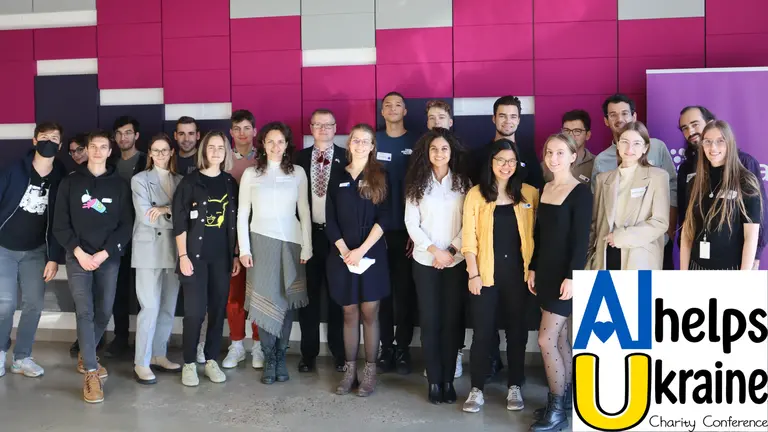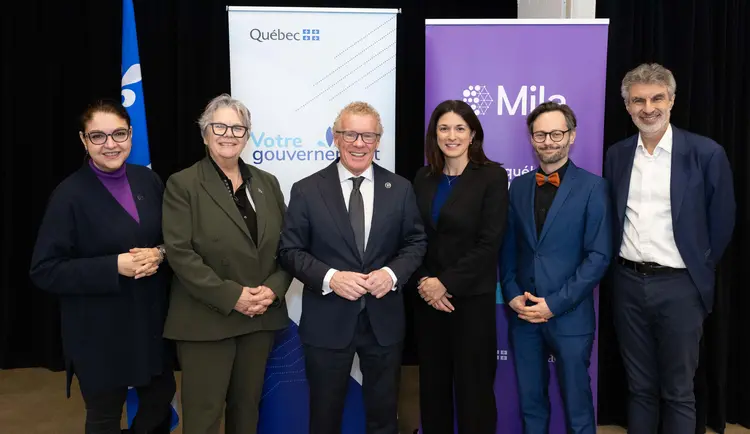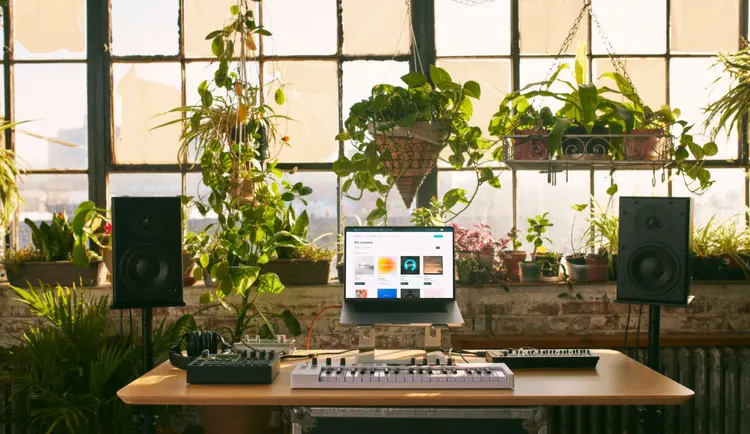
On Thursday, December 8, 2022, the AI Helps Ukraine Charity Conference held its in-person event at Mila’s Agora in front of over nearly 100 students, professors and other members of the Montreal Artificial Intelligence (AI) ecosystem. The event was also live-streamed and the recording is already publicly available online.
Created by a group of Mila affiliated early career researchers, the Conference featured many of the world's leading researchers in AI who presented talks about AI applications for the common good in order to raise funds to help provide humanitarian and medical aid to the Ukrainians. You can still donate to the initiative, see instructions below:
Here is a recap of the event:
The central session of the event was the panel discussion on AI for Social Good with Prof. Yoshua Bengio (Mila), Prof. Anna Goldenberg (University of Toronto, Hospital for Sick Children), Prof. Olga Russakovsky (Princeton University), Dr. Ava Amini (Microsoft Research), and Prof. Oleksandr Romanko (SS&C Technologies Canada, University of Toronto, Ukrainian Catholic University, Kyiv School of Economics, American University Kyiv). According to Prof. Yoshua Bengio, one of the most impactful research directions is developing applications of Machine Learning for natural sciences in order to assist scientific discovery, which can help to fight future pandemics and mitigate climate change. These applications require humans to work in a loop with an AI system which proposes next promising experiments based on the results of the previous trials. Panelists highlighted that reliable uncertainty estimation is crucial for this framework and that novel generative models and Bayesian inference bring us one step closer towards this goal.
Besides the panel, the Conference featured three keynote talks covering different aspects of AI for Good. During the first talk, Prof. Olga Russakovsky reflected on some of the recent work from the Princeton Visual AI Lab on building more trustworthy (and more trusted) computer vision. She covered ways to improve the benchmarks, mitigate the social bias of the systems, and create better model explanations that are more understandable for end users.
Another socially important application of AI is healthcare. During her keynote talk, Prof. Anna Goldenberg covered several of her team’s recent contributions to this field, including time series modeling, explainability, representation learning and generative modeling. Prof Goldenberg reflected on many obstacles including fundamentally unresolved machine learning issues in its application to assist clinicians in the healthcare sector. She also discussed some of the broader computer science contributions the team had to make in order to get them closer to deployment. At the end of her talk, she gave the stage to her students Bohdan Naida and Mariia Rizhko, who moved from Kiev, Ukraine and joined her team shortly after the Russian invasion of Ukraine.
The final keynote presentation was by Dr. Ava Amini, who focused on two settings in which Microsoft Research has developed new AI algorithms to optimize biology and inform the experimental process: biomolecular and experimental design. She first shared recent work in developing a diffusion-based generative model that designs protein structures by mirroring the native protein folding process. Moving from molecules to experiments, she presented a method—evidential deep learning—for uncertainty quantification in neural networks and demonstrated its potential to guide key steps in experimental lifecycles, opening the door for sustained feedback between computation and experimentation in the biological sciences.
Furthermore, the Conference featured an invited talk by Prof. Oleksandr Romanko about the use of AI in the space of education and three presentations by founders of startups on AI for Good, run by Ukrainian entrepreneurs.
Many thanks to all the organizing team members, speakers, sponsors, staff and volunteers who made this event possible.
Supporting organizations: Mila - Quebec AI Institute, Ukraine Medical Support, Google Montreal, IVADO Labs, Stichting Do & Well and Farine & Vanille.
Organizing team: Michael Galkin, Alex Hernandez-Garcia, Dmytro Humeniuk, Julia Kaltenborn, Maksym Korablyov, Kateryna Nekhomiazh, Alexey Ostapenko, Marta Pereira de la Infanta, Mélisande Teng and Alexandra Volokhova.
Speakers: Ava Amini, Regina Barzilay, Inbal Becker-Reshef, Sara Beery, Michael Bronstein, Alexei Efros, Timnit Gebru, Anna Goldenberg, Hannah Kerner, Valentin Kravchenko, Volodymyr Kuleshov, Andriy Mulyar, Bohdan Naida, Irina Rish, Mariia Rizhko, David Rolnick, Oleksandr Romanko and Olga Russakovsky.
Supporters and volunteers: Etienne Collin, Justine Gehring, Anne-Sophie Gill, Karl Goedike, Marc-Antoine Guérard, Gabrielle Hurtubise-Radet, Aton Kamada, Nadine Khairallah, Behnoosh Khavari, Benno Krojer, Hugo Larochelle, Michelle Liu, Lucas Maes, Amin Memarian, Martin Pömsl, Benjamin Prud'homme, Ivan Puhachov, Naz Sepahvand, Beheshteh T. Rakhshan and Polina Tsvilodub.





